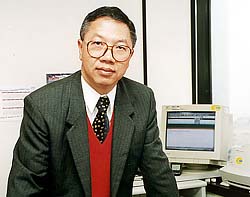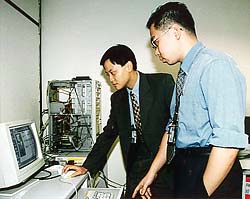



















FORCE IT UPDATE
 Former CSM ITB Alex Ma: "The future will only get better" |
IN terms of information technology (IT), the
Hong Kong Police Force has come an incredibly long way in a relatively short period. And
few have been more atune to this profound change from the era of the typewriter to the
computer age than Alex Ma, who recently concluded a five-year posting as Chief Systems
Manager of the Force's Information Technology Branch.
"When I started my job back in 1995, there were about 600 personal computers and computer terminals Force-wide. Today there are more than 7,000," said Mr Ma, who has been posted back to the Information Technology Services Department. During his tenure as Chief Systems Manager he has seen over 25 systems which form the major part of the Force's IT Strategy become operational. Everything from RICS and FICS to, most recently, POINT Ал the Police Intranet system, which allows for the retrieval of information from the Internet. |
|
"The most challenging system to implement was the Communal Information System (CIS), the major system under the IT Strategy which effects the entire police Force," said Mr Ma. "The CIS is a group of systems that address all the normal day-to-day operations in all the Divisions, Districts, Regions and Headquarters and includes data taken when a case is first reported to the police, until the conclusion of the case before the Courts. "In other words, all case information is entered only once Ал then that can be shared by all members of the Force. The benefits of this system are revolutionary in that at the management level once an analysis of this data is made decisions on the best policing strategies in particular Regions, Divisions or Districts can be implemented, and improvements to Force policy and procedures carried out." Although Mr Ma admits there are still a lot of improvements that can be made to the CIS system in terms of making information retrieval easier and adding on more functions, he has no doubt such changes will be realised. Said Mr Ma: "The current IT Strategy is the building block for the future when the Force extends into more efficient, reliable and integrated information delivery. What has been done in the past few years has laid the foundation for collecting the information at the source. We have taken a 'data warehouse' approach making it much easier to analyse information and the inter-relationship of that data." At the same time, as wireless technology is brought into use, that information will be made directly available to frontline officers whose patrol cars and EU vehicles will be equipped with computer terminals. Additionally, because that wireless network can be shared among other government departments such as Immigrations and Customs, policing in the HKSAR will be greatly enhanced. The most challenging aspect of Mr Ma's job at the ITB was to ensure that the IT strategy implemented today would meet, and could be adapted to, the technological needs of the Force in five to ten years. "You don't want to employ yesterday's technology today," he said. "On the other hand, it would be a high risk to employ tomorrow's technology (if it's unproven) now. For example, once the users' needs are finalised and the development of a new system begins, this process can take anywhere from six to eighteen months, during which time both the technology and the users Ал requirements can change. So you have to strike a balance and ensure that the technology Ал the infrastructure Ал you have chosen is adaptable and can be upgraded. Mr Ma added that in many ways it has been fortunate that the Hong Kong Police Force was not as technologically advanced six years ago as many other police forces who are now finding that their systems are out of date and cannot be easily upgraded. "I am most grateful to DMS Dick Lee Ming-kwai, ACP IS Peter Halliday and all those police officers with whom I've worked. I've grateful for their advice, patience and support in helping to realise an important phase of the Force IT Strategy. The future will only get better." | |
|
THE advancement in technology, the wide
use of home computers, the Internet and its increased use by consumers for shopping and
doing business in electronic commerce has provided the opportunity for criminals to utilise
computers to assist in their illegal activities. The Computer Crime Section of the Hong Kong
Police is determined to provide solutions for policing the anticipated growth of "cyber-crimes"
Ал especially those committed via the Internet, which is on the increase.
The Computer Crime Section was established in 1993 as a result of the Computer Crime Ordinance. As the public has become more aware of Hong Kong's computer crime legislation, the number of computer crime reports has increased. |
 Computer Crime Section officers policing the information highway |
|
The Computer Crime Section is responsible for investigating serious computer crimes; forensic examination of computers for evidential purposes; formulating policies and procedures relating to computer crime; as well as maintaining liaison with Internet Service Providers and other key computer industry sources of information; and training and accrediting police officers in computer crime investigation and forensic examination. According to Computer Crime Section Senior Inspector Leonard Ma there are about 500,000 Internet users in Hong Kong. "But these users' awareness of computer crime is still very low," he said. "Some underestimate the importance of personal computer security and fail to keep their access Personal Identity Number in a safe place, or choose log-in passwords like '8888' or 'PASSWORD' , which can be easily compromised by hackers and other computer criminals. "Additionally, some computer users never activate their mail boxes on the PABX telephone system, which leaves them vulnerable to illegal use of their paid computer services," he added. The Computer Crime Section holds regular meetings with officers of the Crime Prevention Bureau to formulate tactics for the prevention of computer crimes. This policy of prevention of computer crime and encouraging better security by computer users is seen as vital to the strategy of the Computer Crime Section. As co-ordinator between Internet Service Providers and the Force, complaints of computer crimes are referred to the Computer Crime Section for further investigation. Likewise, members of other Force units encountering crimes committed with the use of computers can contact the Computer Crime Section for assistance or advice. The Section is now drafting for distribution to all Police Formations a set of guidelines for handling and reporting computer related crimes. | |

